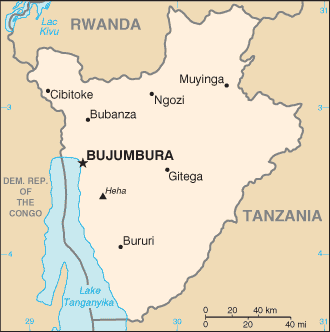 |
usa | world | animals | vocabulary | health | science | math | history |
Burundi Map Courtesy CIA World Factbook
Landlocked, facing population pressures and having sparse resources, Burundi is one of the poorest and most conflict-ridden countries in Africa and in the world. Its small size belies the magnitude of the problems it faces in seeking to bring an end to the supremacist claims of the ruling Tutsi minority with the growing demands for political participation of the Hutu majority. Burundi existed as an independent kingdom from the 16th century. In the 1903, it became a German colony and passed to Belgium in World War I. It was part of the Belgian League of Nations mandate of Ruanda-Urundi in 1923, later a United Nations Trust Territory under Belgian administrative authority following World War II. The origins of Burundi monarchy are veiled in myth. According to some legends, Ntare Rushatsi, founder of original dynasty, came to Burundi from Rwanda in 17th century; other, more reliable sources, suggest that Ntare came from Buha, in the south-east, and laid foundation for his kingdom in Nkoma region. Until the downfall of monarchy in 1966, kingship remained one of last links that bound Burundi with its past.
From independence in 1962, until the elections of 1993, Burundi was controlled by a series of military dictators, all from the Tutsi minority. These years saw extensive ethnic violence including major incidents in 1964, 1972 and the late 1980s. In 1993, Burundi held its first democratic elections, which were won by the Hutu-dominated "Front for Democracy in Burundi" (FRODEBU). FRODEBU leader Melchior Ndadaye became Burundi's first Hutu President, but a few months later he was assassinated by a group of Tutsi army officers. The killing plunged Burundi into a vicious civil war. In retaliation for Ndadaye's killing, Hutu extremists massacred thousands of Tutsi civilians. The Tutsi-dominated army responded by massacring hundreds of thousands of Hutus. Years of instability followed until 1996, when former president Pierre Buyoya took power in a coup. In August 2000, a peace-deal agreed by all but two of Burundi's political groups laid out a timetable for the restoration of democracy. After several more years of violence, a cease-fire was signed in 2003 between Buyoya's government and the largest Hutu rebel group, CNDD-FDD. Later that year, FRODEBU leader Domitien Ndayizeye replaced Buyoya as President. Yet the most extreme Hutu group, Palipehutu-FNL (commonly known as "FNL"), continued to refuse negotiations. In August 2004, the group massacred 152 Congolese Tutsi refugees at the Gatumba refugee camp in western Burundi. In response to the attack, the Burundian government issued arrest warrants for the FNL leaders Agathon Rwasa and Pasteur Habimana, and declared the group a terrorist organisation. In May 2005 a cease-fire was finally agreed between the FNL and the Burundian government, but fighting continued. Renewed negotiations are now under way, amid fears that the FNL will demand a blanket amnesty in exchange for laying down their armss. |
 The Republic of Burundi (formerly Urundi) is a small landlocked nation in the Great Lakes region of Africa. It is bordered by Rwanda on the north, Tanzania on the south and east, and the Democratic Republic of the Congo on the west. Although the country is land-locked, much of its western border is adjacent to Lake Tanganyika where it enjoys access to the Tanzanian ocean port of Dar es Salaam. The country's name derives from its Bantu language, Kirundi.
The Republic of Burundi (formerly Urundi) is a small landlocked nation in the Great Lakes region of Africa. It is bordered by Rwanda on the north, Tanzania on the south and east, and the Democratic Republic of the Congo on the west. Although the country is land-locked, much of its western border is adjacent to Lake Tanganyika where it enjoys access to the Tanzanian ocean port of Dar es Salaam. The country's name derives from its Bantu language, Kirundi.